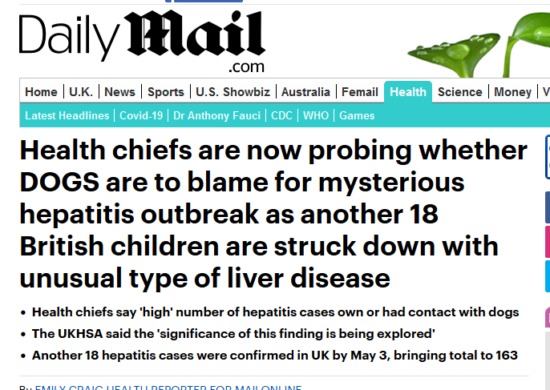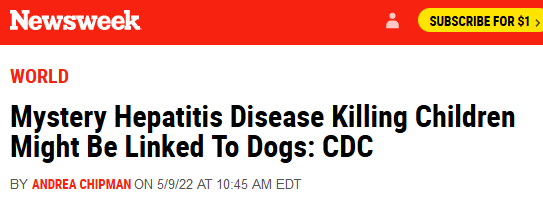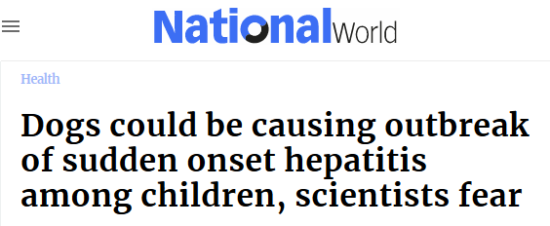Backfiring antibiotics, drugs for cataracts, supplement silliness, and more
18 May 2022
Posted by Andrew Kantor
Clearing vision with chemistry
The latest condition that might be treated by drugs instead of surgery: cataracts. British researchers are working on an oxysterol compound — they gave it the memorable name “VP1-001” — that they hope will cut through the clouding.
It does two things, apparently: 1) it improves the lens’s refractive index profile (61% of the time), allowing it to focus better; and 2) it restores the lens’s protein organization (46% of the time), making it less opaque.
Why not every lens? Good question, and one they can’t answer yet — and that’s why VP1-001 is still in the lab.
The craziest argument against regulation you’ll hear this week
Congress is considering allowing the FDA regulate dietary supplements (and cosmetics and lab-based tests). Among other things, a law would “require supplement makers to submit information, like the products they sell and their ingredients, to the FDA.”
Fighting tooth-and-nail against this is the Natural Products Association. Its argument … are you ready?
Requiring supplement makers to tell the FDA their ingredients “would allow bioterrorists to introduce contaminants into the food supply” when the supplement makers disclosed their super-secret supply chains.
Yep. If you regulate supplements, the terrorists win.
ICYMI: Boost the kids
The FDA has authorized a booster of Pfizer’s Covid-19 vaccine for 5- to 11-year-olds. That is all.
Hormones vs Covid
Women who take hormone replacement therapy are less likely to die from Covid-19 — assuming they received it within six months of their Covid diagnosis.
A study out of Britain looking at 1.8 million women (5,500 of whom contracted Covid) found that either HRT or contraceptive hormones reduced their chance of death once infected.
Questions unanswered:
- Why? Is it something about estrogens?
- What about other people who take these hormones — e.g., transgender folks?
- Do compounded versions have the same effect as factory-made hormones?
“Further work is needed,” say the authors.
Baby formula shortage could be ending…
…in a couple of months. Abbott and the FDA have reached an agreement so the company can start production again — presumably in a cleaner facility, but likely not for several weeks.
Want the details on what caused the shortage? The Atlantic, always happy to write about a depressing topic, has you covered, from plant contamination to pandemic supply chain issues and more:
[America’s] unreasonably protectionist trade policy that makes the U.S. formula market exquisitely sensitive to existential shocks (like a pandemic) and domestic shocks (like a major recall). Today, the shocks are everywhere, and that’s why baby formula is not.
Barking up the hepatitis tree
Those Mysterious Hepatitis Cases that have popped up in toddlers around the world still have no explanation … but at least now there’s fodder for the anti-science crowd.
The UK Health Security Agency noted in a recent briefing that 64 of the 92 known patients were from dog-owning families or had “other dog exposures”. This is not surprising — a third of British homes have dogs, and people also visit dog-owning family and friends.
But mere logic hasn’t stopped the usual penchant for ignoring science (à la Dr. Laura/Oz/Phil) in favor of a bit of sensationalism.
So while the reality is that, “The data suggesting this link is extremely weak — in fact, probably a lot weaker than most of the alternative hypotheses that have been proposed,” as one British immunologist explained, that hasn’t stopped the press from capitalizing….

Stretching the definition of word “might”:

The scientists, they’re afraid:

Meanwhile, some sell the scare but still try to add some accuracy (in small print):

Or maybe it’s … Tylenol?

When antibiotics backfire
Giving patients antibiotics in hospital is normal, but it can, it seems, [also increase their risk of fungal infections. Apparently (and surprisingly) the drugs disrupt the intestinal immune system to the point that not only allows fungus to flourish, but …
…where fungal infections developed, gut bacteria were also able to escape, leading to the additional risk of bacterial infection.
So yes, that’s essentially the opposite of what they were supposed to do. The solution, say the British researchers who wrote the paper, might* be prescribing immune-boosting drugs along with any broad-spectrum antibiotics.
Abuse and MS
Being sexually or emotionally abused as a child may increase a woman’s chance of developing multiple sclerosis. Norwegian researchers found that “people who had experienced sexual abuse as children had a 65% higher risk of developing MS. For those exposed to emotional abuse, there was a 40% heightened risk.”
The risk was even higher among patients who experienced a combination of two or more types of abuse in their childhood, the researchers noted, adding that more research is needed to understand the biological mechanisms through which childhood trauma may contribute to MS.
Interestingly, physical abuse alone did not have a statistically significant effect.
Another piece of the lifespan puzzle
We’ve known for a while that eating less means living longer, and now we have another piece of that puzzle. It’s all about a single hormone called FGF21. You — or, rather, mice — can cut protein intake down all you (they) want, but it won’t make a difference if there’s not enough FGF21 to do the signalling.
But when there is enough, even for middle-aged mice, “FGF21 […] improves metabolic health and extends lifespan.”
What that will mean for humans … well, that’s as yet to be seen.


